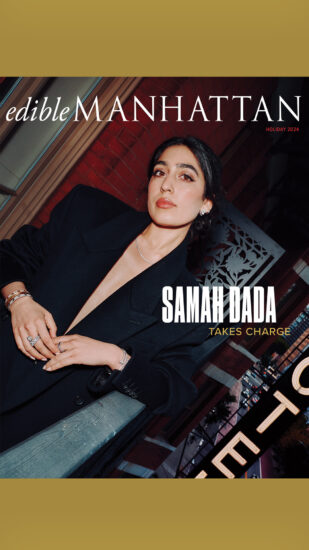
Last fall, while in a mad dash to find my voting poll (it was Election Day) and get my five-year-old daughter fed before school, I stopped at our corner bodega in Harlem. “Cream cheese on a whole wheat bagel, please!” my daughter enthusiastically announced to a tall, white-haired man standing behind the counter. He unfolded his crossed arms, gave her a thumbs-up, and said, “You got it, sweetie! Toasted?” She nodded while grinning back at him.
As we waited, I realized that the ATM wasn’t working. “Ah, crap,” I thought to myself. “How will I pay for this? It’ll be under $5 so I can’t use my debit card. Damn it.”
When this big-hearted man handed my daughter her warm, foiled-wrapped breakfast, she quickly uncovered it. Her face lit with pure joy as she took her first bite. I frantically rummaged through my bag for the $2.50 that I owed. He clearly noticed that my neurosis was hitting its peak. Still, he waited patiently as I tried explaining why I should “really carry cash in New York City.” He let me pretend that I was, in fact, a responsible adult.
Finally, he interrupted my frenzied search by saying, “Don’t worry! Come back another day and you can pay for it then. No problem.” I smiled with relief. “Let the sweet girl enjoy her breakfast!”
And that, folks, is why “Bodega,” a start-up created by two ex-Googlers, isn’t going to (and shouldn’t be given the opportunity to) succeed. Real bodegas are cornerstones for fostering communities, celebrating neighborhoods’ cultural identities and encouraging human interactions. They are the glue that brings people (and cats) together.
But this so-called Bodega start-up wants to erode that specialness by installing unmanned pantry boxes (aka glorified vending machines) in apartments, offices, dorms and gyms. Paul McDonald, who spent 13 years as a product manager at Google, aims to “disrupt” or put real bodegas and mom-and-pop corner stores out of business. He launched the start-up yesterday with his co-founder Ashwath Rajan, another Google veteran.
“The vision here is much bigger than the box itself,” McDonald said, according to an article by Fast Company. “Eventually, centralized shopping locations won’t be necessary, because there will be 100,000 Bodegas spread out, with one always 100 feet away from you.”
But can a box serve an affordable cafecito and delicious ham sandwich oozing with cheese to the nurse who starts her shift at 4 a.m.? Can the box say, “Hey, don’t worry, just pay me next time when you have cash”? Can the box fix you up a chopped cheese on a roll while you’re in a drunken stupor at midnight? Can the boxes unite to protest against discrimination? I think not.
Artist M. Tony Peralta, a Washington Heights native and Dominican, treasures his neighborhood, specifically the bodegas, bakeries and restaurants that have been around since he was a kid.
“What annoys me is that white people kind of deny themselves that great interaction. If that white person or whoever doesn’t know how to speak Spanish, those people are still going to show you love,” he told me over a phone call. “The immigrant always wants to show you their culture. They are not gonna keep it from you.”
https://www.instagram.com/p/BZBhi9wDPE8/
McDonald believes that his start-up will optimize sales for big companies and emerging brands. In response to the backlash McDonald received from loyal bodega patrons, he conducted and published his own Q&A. He asked and answered questions like, “Is this just for Kind Bars and coconut water?” (FYI, coconut water is also a gentrified commodity.)
Will Veras is the 34-year-old owner of a bodega called Williams Grocery on Dyckman Street. Veras has worked at the bodega since his parents took ownership of it 17 years ago. He resents the idea of the Bodega start-up because it “will cut off the human interaction between the consumer and seller.”
“There are a lot of lonely New Yorkers and sometimes they just come to their local bodega to have conversations or get things off their chest,” Veras told me. “If you stick a vending machine in a lobby of an apartment building, it’s not gonna talk back to these people who want and need conversation every day.”
For Veras, bodega means family-oriented business. “Do you know how many kids I’ve seen grow up and go to college?” he said. “I’ve got customers who come in who don’t even need to tell me what they want. I know what they want and it’s ready for them on top of the counter.”
Just like gentrification, these zero human interaction boxes want to callously erase the culture, traditions and history that is dear to people of color and immigrants. It’s a good way for many to opt out of interacting with the locals they are looking to culturally (and financially) rob and displace.
For more reading on the importance of bodegas in New York City, check out the project Bodega Stories, “Inside the All-American Yemeni Bodega Strike” at The Fader and “The Legacy of the Puerto Rican Bodega” at Centro PR.



